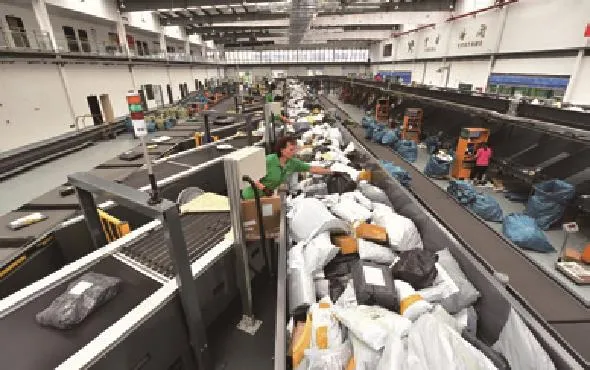HEADING FOR RIO
2016-09-22
HEADING FOR RIO

Members of the Chinese delegation for the Rio Paralympics depart Beijing for Brazil on August 30.
The 15th Paralympic Games take place in Rio de Janeiro from September 7 to 18. The 499-member Chinese delegation, which includes 308 athletes who compete in 328 events across 17 sports, is the largest China has ever sent to an overseas Paralympics.
Joyful Interaction

Members of the Chinese Women’s Volleyball Team take part in a parade in Hong Kong on August 29.
A 64-member delegation including 45 Rio Olympic athletes from the Chinese mainland visited Hong Kong and Macao from August 27 to September 1 to meet and communicate with local residents.
Discharge Standards
Five new standards for pollutant discharge have been issued, according to a statement by the Ministry of Environmental Protection (MEP) on August 30.
The documents, jointly issued by the MEP and the General Administration of Quality Supervision, Inspection and Quarantine, include emission caps for ship engines, motorcycles and hybrid electric cars as well as limits on discharges from caustic soda and polyvinyl chloride (PVC) industries.
Compared with the current standards, discharges of chemical oxygen demand (COD) in waste water, particulate matter in exhaust gas,chloroethylene and non-methane hydrocarbon will be slashed by 77,51, 72 and 58 percent, respectively, under the new standards, the statement said.
It said that these new standards are part of measures to implement action plans on air and water pollution prevention and control.
Healthy China
The Political Bureau of the Communist Party of China adopted the Healthy China 2030 program on August 26.
The primary goal of the plan is to enhance people’s health, with key groups such as women, children,seniors, migrants and low-income groups receiving particular attention.
Future efforts should focus on promoting healthy lifestyles, optimizing health services, improving health security, building a healthy environment and developing health industries, according to the meeting.
It also stressed that the government should play a leading role and that the public should be mobilized to participate.
Court E-Documents
China Judgment Online, a website featuring over 20 million court documents, has registered more than 2 billion hits by users from over 190 countries and regions, the Supreme People’s Court (SPC) said on August 30.
Among the visits to the website(http://wenshu.court.gov.cn), more than 500 million were from overseas users, including 100 million from
North America.
Chinese courts have been
gradually uploading their documents to the site since 2014.
Judgment documents, except those involving state secrets and crimes by minors, should be released online, the SPC said on July 25.
Afforestation Achievements
China is home to 69.3 million hectares of artificially grown forests, the largest in the world, following more than six decades of afforestation work, said Zhang Jianlong, head of the State Forestry Administration.
Total forest acreage has grown to 208 million hectares from 82.7 million hectares in the early 1950s,covering 21.66 percent of the land area, compared with 8.6 percent more than 60 years ago, Zhang said at a national afforestation conference on August 26.
Drought and excessive lumbering with little awareness of conservation had exacerbated water and soil erosion as well as desertification in China. In 1979, the country launched a 70-year tree-planting program in its northern, northwestern, and northeastern regions to improve the environment.
China has effectively contained desertification, with its desert land area shrinking continuously over the past decade.
The area of formerly productive land degrading into deserts has been contracting at an annual average of 2,424 square km for over 10 consecutive years, Zhang said in a separate occasion.
Ethnic Support
The Ministry of Finance (MOF)announced that 2.385 billion yuan($357 million) had been allocated in 2016 so far to support ethnic cultural development in minority areas.
The funding has been used to protect and utilize the cultural heritage of minority groups, provide public culture services to ethnic minorities and protect the basic cultural rights and interests of minority groups, said the ministry.
China has made great efforts to protect the rights and interests of ethnic minorities. It has achieved a lot in reducing poverty in minority regions.
From 2012 to 2015, the number of poverty-stricken people in minority regions, including the five autonomous regions of Inner Mongolia, Guangxi, Tibet, Ningxia and Xinjiang, and the three provinces of Guizhou, Yunnan and Qinghai,plummeted from 31.21 million in 2012 to 18.13 million in 2015, according to a report released in June.
The GDP of the eight ethnic minority regions increased from 5.85 trillion yuan ($876 billion) to 7.47 trillion yuan ($1.2 trillion), and the per-capita disposable income of permanent residents in cities and towns soared from 20,542 yuan ($3,076)to 26,901 yuan ($4,028) in the same period, said the report.
Rural Freshmen
Over 90,000 students from rural and poor areas have been admitted to colleges this year, an increase of 20 percent from last year, the Ministry of Education said on August 29.
To recruit more students from rural and poor areas, universities have expanded enrollment and introduced some preferential policies. Some universities have simplified enrollment procedures and also give economic support to students from families with difficulties.
The Ministry has disqualified all students who make false statements in their records and suggests universities recheck students’ qualifications after they enter college.
Judicial Pilot
A program to pilot plea bargains in criminal cases will be launched as part of efforts to find balance in criminal justice decisions.
According to a proposal submitted on August 29 by the Supreme People’s Court and Supreme People’s Procuratorate to the Standing Committee of the National People’s Congress (NPC), the country’s top legislature, suspects and defendants will be allowed to plead guilty in return for a lesser charge.
The measures will be piloted in 18 cities including Beijing, Tianjin,Shanghai, Chongqing, Shenzhen,Xiamen and Guangzhou.
The pilot aims to “further improve criminal procedures,implement a policy that combines punishment with leniency, and more reasonably allocate judicial resources,” according to a statement from the NPC Law Committee.
Spending Rules
China has moved to set standards for the philanthropic spending and administrative expenses of charitable organizations and has told them to publish the two items in detail.
Any foundations, social groups and social service providers qualified to initiate public donations should spend at least 70 percent of their revenue from the previous year,according to the set of standards released on August 25 by the Ministry of Civil Affairs for soliciting public opinions.
Meanwhile, the administrative expenses of charitable foundations supported by public donations should not exceed 10 percent of their annual spending, while the maximum quota is 13 percent for other authorized social groups and social service providers, according to the regulation.
The regulation also set public spending and costs standards for charitable organizations that are not qualified for public donations, based on their annual net assets.
Detailed spending and costs must be publicized in the annual reports of all charitable organs, it said.

School Preparation
Teachers decorate a wall with paintings in Hehui Elementary School in Xingtai,Hebei Province, on August 30, two days before the start of the autumn term.
Students across China returned to school for a new semester at the end of August or the beginning of September.

Ethnic Performance
A dance show by members of the Hui ethnic group is staged during the Fifth Minorities Art Festival at the Tianqiao Theater in Beijing on August 29.
During the event from August 18 to September 14, more than 7,000 ethnic minority artists will perform a total of 43 shows.
Aluminum Giant Acquisition
Aluminum maker Zhongwang on August 29 announced plans to acquire its U.S. counterpart Aleris Corp. for $2.33 billion.
The buyer, Zhongwang USA LLC, an entity controlled by Zhongwang’s founder Liu Zhongtian,agreed to acquire Aleris from its private equity owners for $1.11 billion,plus $1.22 billion of net debt. The deal will not change the current management of Aleris.
The billion-dollar-plus deal will allow Zhongwang to further engage in the global market, said Liu, adding that he values the experienced management, leading technology, and global client list of the Clevelandbased metal producer Aleris.
Hong Kong-listed Zhongwang,based in northeast China’s Liaoning Province, is the world’s second largest aluminum extrusion product manufacturer.
Aleris, which has 13 production facilities located throughout North America, Europe and China, provides rolled aluminum for various industries including the aerospace,automobile, defense, transport and construction sectors.
P2P Supervision Tightened
The banking watchdog issued a set of regulations on August 24, aiming to tighten supervision of the country’s booming peer-to-peer (P2P)lending industry.
The document imposes a series of restrictions on P2P platforms,prohibiting them from accepting public deposits, pooling investors’money for their own projects, providing guarantees for lenders, or selling financial products, according to the China Banking Regulatory Commission (CBRC).
P2P lending, which has no traditional financial intermediary such as a bank, has seen rapid growth in China in the past few years, as investors seek higher returns, and small businesses find it easier to secure funds through P2P platforms.
The lack of supervision, however,causes considerable risks. Fraud,fund flights and illegal fundraising are common, and some investors have been left penniless as many P2P platforms went bust.
At the end of June, there were 1,778 P2P lending platforms with operational problems, accounting for more than 40 percent of the total. Outstanding loans issued by P2P platforms have reached 621.3 billion yuan ($93.6 billion), according to CBRC data.

Boosting Cross-Border Efficiency
Employees at the Yiwu International Mail Exchange Bureau sort out outbound packages in Yiwu, Zhejiang Province, on August 27, with the total number exceeding 300 million that day.
Since the bureau was established on December 31, 2015, mail packages have been sent to 127 countries and regions.
Goods Standards Promoted
A new plan to promote standards and quality in consumer goods, initiated by China’s quality watchdog and other departments, will be made public soon, an official said on August 26.
The guideline was approved during the State Council’s executive meeting chaired by Premier Li Keqiang on August 24, said Tian Shihong, head of the Standardization Administration of China, at a press conference.
The new guideline is in line with the country’s ongoing economic transition from an investment-driven economy to a more consumptiondriven one.
According to the new guideline,by 2020, more than 95 percent of consumer goods in major sectors should meet international standards,up from the current level of 80 percent, Tian said.
Steel Turnaround
Major listed steel companies saw a profit turnaround in the first half of 2016, but pressure to cut overcapacity in the sector remains high.
In a report filed to the Shanghai Stock Exchange, the Shandong Iron and Steel Co. said its net profits stood at 23.15 million yuan ($3.5 million) in the first half of the year, surging over 210 percent year on year.
Net profits for Inner Mongolia Baotou Steel Union Co. Ltd. reached 27.52 million yuan ($4.12 million) in the first half, an increase of over 117 percent year on year.
Sansteel Minguang Co. in Fujian Province saw its first-half net profits jump more than 233 percent year on year to 360 million yuan ($53.91 million).
Of the 19 steel companies that have already released their profits in the first half of the year, 13 companies reported profit rises, with eight seeing profits more than double.
The 19 steel companies’ combined total net profits reached 2.3billion yuan ($344.47 million) in the first half of the year, compared with a loss of 1.57 billion yuan ($235.14 million) during the same period last year.
Both the Shandong Iron and Steel Co. and the Inner Mongolia Baotou Steel Union said that rising steel prices in the second quarter contributed to profits.
Steel makers have faced difficulties over the past few years due to shrinking demand and excessive capacity built up during decades of rapid expansion.
However, steel prices have risen in the past few months amid temporarily strained supply, as some producers have scaled back output to avoid losses.
Reviewing Investment Laws
Legislators began their first reading of draft amendments to four laws regulating foreign and Taiwanese investment at a bimonthly session on August 29.
The four laws include the Law on Foreign-Capital Enterprises, the Law on Chinese-Foreign Equity Joint Ventures, the Law on Chinese-Foreign Contractual Joint Ventures, and the Law on the Protection of Investment From Taiwanese Compatriots.
In two temporary resolutions in 2013 and 2014, the National People’s Congress (NPC) Standing Committee authorized the State Council to bypass these laws and allow foreign and Taiwanese investors to establish firms in Shanghai,Guangdong, Tianjin and Fujian free trade zones (FTZs) without government approval. Such investors are only required to report business plans to local regulators if their business is not on a “negative list.”
The first temporary adjustment will expire on September 30, and the government now needs a new, longterm legal basis for the adjustments,which have proved to be “effective.”
“The trials in the four FTZs had notable effects in the last two years,”China’s Minister of Commerce Gao Hucheng told the lawmakers on August 29. The time required to set up a business in the FTZs was reduced to less than three days from more than 20 days.
In the first half of 2016, a total of 4,923 foreign-funded firms were established in the four FTZs, investing 359 billion yuan ($54 billion).
According to a poll conducted by the Development Research Center of the State Council, 90.9 percent of firms surveyed said the new mechanisms encouraged foreign companies to “increase” or“substantially increase” investment in China. All respondents believed it is now “easier” or “much easier” to start a business there.
Now it is time to expand the trials, Gao told the NPC session.

Less Vehicle Emissions
A pure electric bus is cleaned at a control station in Jingjiang, east China’s Jiangsu Province, on August 27.
Recently, a total of 50 pure electric buses have been put into use in Jingjiang, and each one can run 150 km on one charge. Now, there are 146 new-energy and clean-energy buses in the city, making up 64.3 percent of the city’s total buses.
Chinese Trains In Thailand
A new train from China purchased by the State Railway of Thailand(SRT) was launched on August 29—Thailand’s first new train in 20 years.
The train ran from Bangkok to Nakhon Pathom and then returned to Bangkok on its first trip, while the SRT will put Chinese-made new trains into service on the Bangkok-Chiang Mai route in October and eventually on three other routes as well: Bangkok-Ubon Ratchathani,Bangkok-Nong Khai; and Bangkok-Hat Yai.
The SRT has contracted the China Railway Rolling Stock Corp.’s Changchun Railway Vehicles Co. Ltd. to purchase 115 new carriages at a price of 4.98 billion baht ($143 million). The first batch of 39 trains was handed over to the SRT on July 14. The SRT had been conducting test runs for the last month.
“We will hand 115 carriages in all to the SRT in October,” said Liu Gang, deputy general manager overseeing international business of the Changchun company, adding that these carriages greatly improved the Thai railway service.
According to the SRT, once a double-track railway is built, these new trains, whose top speed is 120 km per hour, can save about three hours of travel time for passengers compared to older trains.

Ecological Economy
A cellar in Hongsibu District of Wuzhong, northwest China’s Ningxia Hui Autonomous Region, on August 30. To date, the district has planted 106,000 mu (7,067 hectares) of wine grapes and can process 40,000 tons of grapes annually.
SOMALIA

Government soldiers secure the site of a bomb explosion at a popular hotel which killed at least seven people and injured several others in the nation's capital on August 30
BRAZIL

Michel Temer (center) signs documents as the new President of Brazil in Brasilia on August 31, after Dilma Rousseff was stripped of the presidency by the Senate in an impeachment trial
UNITED STATES

Secretary of Defense Ash Carter (left) and visiting Indian Defense Minister Manohar Parrikar announce an agreement to allow their military forces to use each other's bases for repairs and replenishment,in Washington, D.C. on August 29
TURKEY

President Recep Erdogan attends a military parade marking the 94th anniversary of Victory Day in the Turkish War of Independence at the mausoleum of Mustafa Kemal Ataturk,the founder of the Republic of Turkey, in Ankara on August 30
THAILAND

A light show takes place on the country's new tallest skyscraper, the MahaNakhon tower, in central Bangkok on August 29,as a part of celebrations to mark the 314-meter-high building's official opening
ITALY

Soldiers carry the coffin of an earthquake victim after a funeral ceremony in Amatrice, central Italy,on August 30. The death toll from the recent magnitude-6.0 earthquake in the region had risen to 292 by August 31
